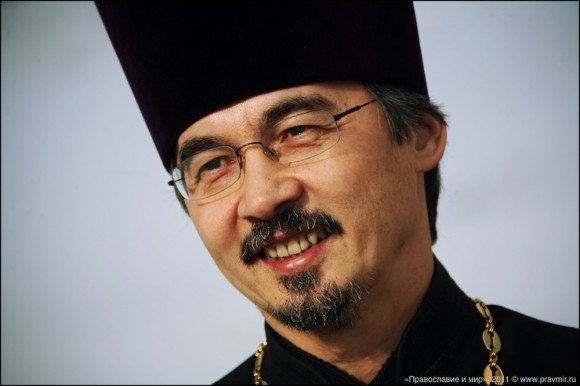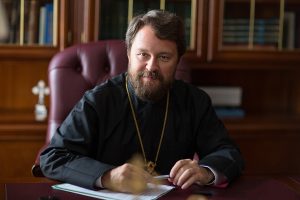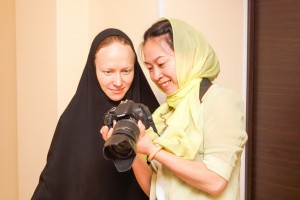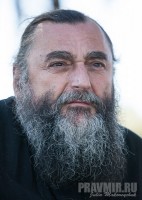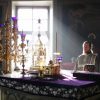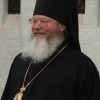Archpriest Nicholas Kim came to the Church from a scientific background – his secular education was in Physics. Our conversation with him covers faith and science, Orthodoxy in Hungary, young people and spiritual life, and holiness.
Archpriest Nicholas Kim works with the Church’s Department of External Relations and he has a long track record – eight years in a parish near St Petersburg and then ten years in Hungary. Now he serves at the church attached to the Russian State Social University.
He came to the Church from a scientific background; his secular education was that of a physicist. Our meeting began by discussing the path that he took towards faith as an academic.
Science teaches us to ask questions
– The main quality of a real scholar is total honesty with himself and those around him, and to seek out answers without creating any illusions. Science teaches us how to ask questions in the right way and how to look for answers, but does not itself provide any answers.
When I became a priest, I was amazed to discover that many of the most distinguished priests were my colleagues by their secular education, for example, Fr Januarius (Ivliev), who is a leading expert in our Church on the New Testament and who supervised my master’s thesis, or Fr Vladimir Shmaly, who supervises post-graduate studies in the Church.
Each of us has our own path to Christ. The main thing is that the troubled human reason seeks and does not stop at half-truths. And when you are racing here and there on these quests and suddenly come across the Orthodox world – there is not just some outward contact, but also the feeling that somehow this is it: this is what you had been looking for the whole time.
This feeling that the truth is very close in Orthodoxy is several degrees stronger than in other religious systems.
Here is how it happened. After University, I worked in science. This did not give me any inner satisfaction. There began a period of spiritual searching and at one point I found myself in the Monastery of St Joseph of Volotsk. Basically, to put it into words, nothing special took place – each of us has some experience of prayer in a monastery, but this feeling of inner illumination, satisfaction, returning home and the closeness of the truth came to me then and has not left me since.
The University Church – the Birth of a Community
– Tell us something about the church where you serve now.
– The history of the University church of the Fyodorovskaya Icon of the Mother of God is very short – only five years.
The initiative to build it came from the Chancellor of the University, Vasily Ivanovich Zhukov, who is a member of the Academy and is very devout. It was a bold idea – to set up a church in a secular higher educational establishment – and so set an example for the fruitful co-operation between University and Church, that there is no contradiction between faith and knowledge, science and religion, but on the contrary, these two aspects of the human spirit mutually complement and aid each other.

The Church attached to the Russian State Social University
Young People are Spoilt – a Myth
– What spiritual problems do you see among today’s young people?
– The same as anywhere else in the world: hard-heartedness, selfishness, the reserve of those around us – new trends added by the modern world to problems that have already existed for centuries. People are fully connected to one another through modern means of communication and yet, so it seems, these means do not so much bring people together as separate them.
In this huge world we can now connect to millions of people in a second – and still be alone. Loneliness in cities, loneliness in this great world exist when everyone is connected by telephone and computer, but people are alone in their souls.
As ever, there are many false aims. With the development of technology whose spiritual benefit is doubtful there are many temptations…
– How do you talk to young people about chastity? Even among some priests there is an opinion that chastity is a myth.
– There is no room for complacency, but neither should we make it worse than it really is. To say that young people have been totally spoilt is also, in my view, a myth. I have met and meet young people today who are chaster than those of the generation when I was young.
In order to talk about chastity to students and young people today, and in general to anyone at all, first and foremost you have to be honest. There’s no need to ingratiate yourself, to pander to people and humour them, but there’s no immediate need either to present them with the whole legacy of the Holy Fathers. You just have to respect their personality, respect their position, be honest with yourself and with them. And this is the main thing, because when people feel honesty and sincerity, then you can pursue a dialogue.
If people feel you are insincere, then it does not matter what you say, everything will be meaningless. There are so many lies in the world around us that people are quite immune and if they detect hypocrisy, then all at once every layer of their soul closes up and it does not matter what you say after that. The main thing is to keep a sincere frame of mind.
-When we speak about Christ, what do we start with?
– What do we start with? Perhaps rather – Who do we start with?
We must speak as though it were for the last time, as though this were the last opportunity to bring someone to God. Any excuse will do to start the conversation.
It is best to talk about something you know well. You can talk about the life we all live, about human problems. You can talk about your own path in life. But you have to start with Christ. Christ is the Way, the Truth and the Life. This is why we must talk truthfully – that is, sincerely, honestly, in a living way, about things that apply to our lives, not abstractly.
Any conversation with a Christian, priest or layperson, must have some direction, be a stimulus for the others. You must avoid falling into gossip and small talk, by being concrete, simple and clear…You must keep the same direction – towards the Way, the Truth and the Life.
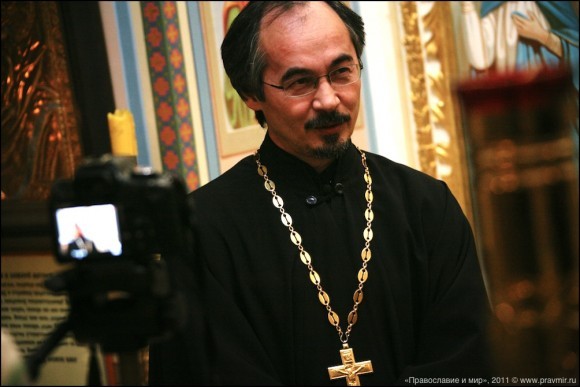
The Crisis of Faith: Only Christ Can Help
– Why is it that people find and lose faith?
– There are various reasons. One person may be grief-stricken, but someone else may come to Christ precisely because of grief. One person may be spoilt by success and money, he gets proud and forgets the Person from Whom he received everything, yet on the other hand another successful person may thank God and his faith stems from that gratitude.
People, especially those whose faith is not yet very robust, are put off by any hypocrisy, hard-heartedness or lack of feeling they happen to come across in the Church, either on the part of priests or on the part of parishioners. People may come to church and find neither warmth nor goodness there. And it must be said that sometimes you encounter more bad feeling inside the Church than in the outside world.
– How can we try and help someone who is going through a crisis of faith?
– Only Christ can help us in this.
We can to some extent support people with words, by saying that a crisis of faith is in fact what everyone goes through. Just by saying, it’s hard for you, and me, and everyone, we are all soldiers of Christ, spiritual warfare is a battle. Who said that war is easy? When we accept Baptism, we come to church, we are Churched, nobody is promising us roses round the door and communion with the angels – we are promised a spiritual battle, warfare, hard work.
Most of us go through this spiritual desert. It is easy to have faith when everything runs smoothly. You can pray, you may feel grace during services. But these are all gifts of God, gifts of the Holy Spirit. None of this happens because we deserve it. The Lord has stood us up on our feet like a toddler; He has taken our hand and guided our first steps. But as time passes, we have to learn to walk by ourselves.
We know from their lives that many saints went through this too. Remember St Silvanus of Athos who recalled his life and told the story of how he wept for many years because he could not feel this grace.
We must toil to go through this desert, but there is a reward for our toil, one we can look forward to – entering the Kingdom of God.
The Experience of Betrayal – When They Beat Us, We Only Get Stronger
– Our experience in the Church is based on our experience of life, so the next question is a little separate from that of Church life: How do we cope with betrayal?
– We cope with betrayal, just as we cope with the wind and the rain, as one of the elements. One of the disciples, one of the friends of Christ was a traitor – everyone can be false. The main thing is that when we come up against this, we should not despair in everyone, in God, in the world. No, after the rain comes the sun and when it is sunny, we have to remember that the rain will come back again. Betrayal exists, but noble people also exist.
Perhaps that person will repent afterwards and do something good, perhaps not to us, but to someone else. And if it is not him, there are lots of other people who are sincere in their faith, who can support us and have noble feelings in their souls. One person can betray us, but the same person can act nobly and vice versa – someone who acts nobly can also betray us.
We should not draw any general conclusions from this, wiping out our whole life, changing our views of people and of the world. If we go for a walk in the woods, we may get bitten by a snake because snakes bite, but that does not mean that the world is bad. We came into this world, the Lord supports us, the world is beautiful, but the reality is that death also exists, that evil exists among people.
It is hard to cope with betrayal, but we must approach it with prayer, remembering the path that Christ took, calmly, with hope in God’s will.
When we see we have trusted someone and that they were untrustworthy, we have yet another reason to trust in God alone. Ideally, our encounter with betrayal should strengthen our faith. Generally speaking, this is a Christian quality – when they beat us, we only get stronger.
The Encounter with Holiness
– The opposite of betrayal, which is the greatest fall, is holiness, which is the ultimate closeness to God. Can you tell us if you have ever met any saints?
– We often simply meet people in church or in the street. You expect to meet the usual hard-heartedness or indifference, but instead you meet an understanding, sympathetic look. Any unconditional good is already a miracle, a manifestation of holiness.
I thank God for granting me such meetings, for example, with the well-known Elder Nikolai from the island of Zalita. He blessed me for the priesthood. The question was inside me, but I could not make up my mind to ask it. Fr Nikolai came up to me and said: ‘You will be a priest’.
And then in Hungary I met the Serbian Bishop Daniel (Krstich) of Budin. I often met him and talked to him between 1999 and 2002, when he reposed.
He was a man of holy life. He had studied in Paris with Kartashov and Florovsky at the Theological Institute there. He was a linguist by education, but also a philosopher and had no interest in money at all. He had a Paschal mind, like St Seraphim of Sarov. The house where he lived was always open, the door was never locked and if someone called in, he would say to them: ‘How glad I am, how glad, come in’.
I first met him in 1999 during the war in Serbia. I came with the mentality; here I am from St Petersburg, all we Orthodox are praying for our brother Serbs, we need to help in some way. Yet although Vladyka was an ardent patriot (I know he did a lot for Serbia), he spoke only of Christ and the Resurrection, as if he had been an eyewitness.
For him politics was futile and the main news was the Resurrection of Christ and he was a witness of this Resurrection. And for each person who met him, everything else took back seat.
Such faith, this Paschal mentality, love for our neighbour, a total separation from everything futile, and at the same time the highest education (for example, he spoke all the European languages fluently), all of this was combined in one person and being with him was sheer pleasure.
I owed him a filial duty which I managed to do when I returned from Hungary: a book of his articles and sermons was translated into Russian and I collected people’s memories of him with photographs and wrote a commentary. Although a lot of historical, philosophical and literary terminology is used in the book, it is very easy to read and is suitable for everyone, for the scholar and for the man in the street, for the believer and for the non-believer.
The anthology was published by ‘Alitheia’ in 2010 and we organised the book presentation in Budapest. It has a very interesting title, ‘In the Beginning was Meaning’. Vladyka was a linguist and he loved to take the various meanings of each word. ‘In the beginning was the Word’…Now ‘The Word’ is ‘Logos’ in Greek and one of the meanings of ‘Logos’ is meaning and he would focus attention on this.
Or, for instance, one of his favourite sayings was, ‘Praise be to God, the Creator of heaven and earth’. The Greek word for Creation is ‘Poema’ and beauty is one of the main principles of the creation. And that was the theology of Bishop Daniel – beauty, goodness, openness and joy.
The book has been published, perhaps it will go into a second edition and we will help others to encounter this really holy man.
– So what is more striking in human relations: meanness or holiness?
– Of course, it is holiness that is more striking because meanness is a trait of human nature, whereas holiness is a manifestation of the Spirit of God in us, in our life. Meanness is very common, we just accept it, but holiness is amazing. To meet a holy person, holiness, even if just for a minute, means that that minute makes life worthwhile.
 Orthodoxy in Hungary
Orthodoxy in Hungary
– You served for ten years as a priest in an Orthodox church in Budapest. Tell us about your experience of serving in Hungary, about your parishioners.
– They were bright, joyful years, though, compared to St Petersburg where hundreds and thousands of people come to feast day services, parish life there was very modest. In general, Hungary is the hardest country to live in for our emigrants – there is a permanent population of several thousand Russian speakers. The church I was bringing back to life in Budapest had only a few people, but it really was a community – the Body of Christ.
A church outside Russia is not only a place of prayer, repentance and cleansing, it is also a piece of every emigrant’s home country, a place where they feel at home, where they are among their own. Sometimes you have to correct people’s over-emotional attitude, reminding them that the centre of our life is the Liturgy, the Eucharist, and not the all the secondary folklore elements such as music and food specialities.
I used to serve in the memorial-church of the Grand Duchess Alexandra Pavlovna Romanova, the eldest daughter of Emperor Paul I, the spouse of the Hungarian ruler, Joseph Hapsburg. It is in the town of Yurin near Budapest and is dedicated to the holy martyr and Empress St Alexandra.
The Grand Duchess Alexandra Pavlovna only lived in Hungary for eighteen months before dying in childbirth. Her confessor was Archpriest Andrei Samborsky (also an interesting personality: a philosopher, a liberal, a high-level politician, a promoter of Speransky and friendly with the Decembrists…). He got the memorial-church built very quickly, so as to dispel rumours that the Grand Duchess Alexandra had become Catholic before she died.
As a result of this, when her younger sisters, who had also married into European ruling families, died, they too had Orthodox churches built over their tombs.
– Do ethnic Hungarians show any interest in Orthodoxy?
– Some, yes. In Budapest there are a few hundred Hungarians who have joined the Orthodox Church and in Hungary as a whole there are a few thousand. Those I saw in Budapest belonged mainly to the intellectual elite: they were linguists, historians, philosophers, university people with deep spiritual needs.
Most Orthodox Hungarians have come to the faith consciously, as adults, they have converted from other confessions after an inner struggle, somewhere or other they have actually broken with ancestral tradition in order to find the truth in Orthodoxy.
Interview by Maria Senchukova. Video by Petr Kaminsky. Photos by Mikhail Moiseyev.
Translated from the Russian












